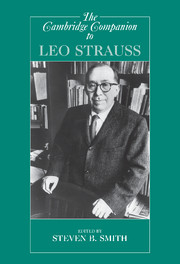Book contents
- Frontmatter
- 1 Introduction: Leo Strauss Today
- 2 Leo Strauss: The Outlines of a Life
- 3 Leo Strauss and the “Theologico-Political Predicament”
- 4 Strauss’s Recovery of Esotericism
- 5 Strauss’s Return to Premodern Thought
- 6 Leo Strauss and the Problem of the Modern
- 7 The Medieval Arabic Enlightenment
- 8 “To Spare the Vanquished and Crush the Arrogant”: Leo Strauss’s Lecture on “German Nihilism”
- 9 Leo Strauss’s Qualified Embrace of Liberal Democracy
- 10 Strauss and Social Science
- 11 The Complementarity of Political Philosophy and Liberal Education in the Thought of Leo Strauss
- 12 Straussians
- Bibliography
- Index
- Series List
11 - The Complementarity of Political Philosophy and Liberal Education in the Thought of Leo Strauss
Published online by Cambridge University Press: 28 November 2009
- Frontmatter
- 1 Introduction: Leo Strauss Today
- 2 Leo Strauss: The Outlines of a Life
- 3 Leo Strauss and the “Theologico-Political Predicament”
- 4 Strauss’s Recovery of Esotericism
- 5 Strauss’s Return to Premodern Thought
- 6 Leo Strauss and the Problem of the Modern
- 7 The Medieval Arabic Enlightenment
- 8 “To Spare the Vanquished and Crush the Arrogant”: Leo Strauss’s Lecture on “German Nihilism”
- 9 Leo Strauss’s Qualified Embrace of Liberal Democracy
- 10 Strauss and Social Science
- 11 The Complementarity of Political Philosophy and Liberal Education in the Thought of Leo Strauss
- 12 Straussians
- Bibliography
- Index
- Series List
Summary
Leo Strauss established himself among the leading students of Western political thought in the second half of the twentieth century and a renowned teacher of future teachers of that subject. He taught but also thought carefully about teaching. In his maturity, he was a professor in a number of American universities (New School, University of Chicago, with which he is most famously identified, Claremont Men's College and St. John's College in Annapolis) and one who reflected on liberal education in a liberal democracy. At the same time, Strauss was an inheritor of classical German education as it existed in the early twentieth century. In this capacity, he contributed two important essays explicitly devoted to the problem of liberal education, although his work as a whole can be seen as an ongoing and open-ended set of reflections on the broader problem of education and democracy.
- Type
- Chapter
- Information
- The Cambridge Companion to Leo Strauss , pp. 241 - 262Publisher: Cambridge University PressPrint publication year: 2009
- 2
- Cited by

